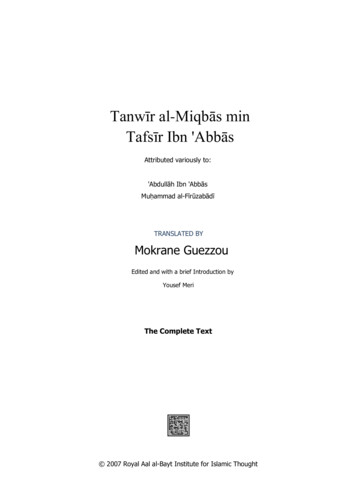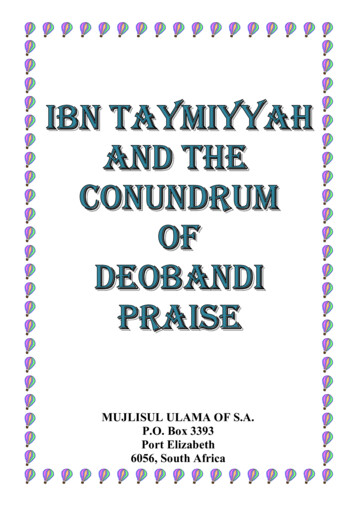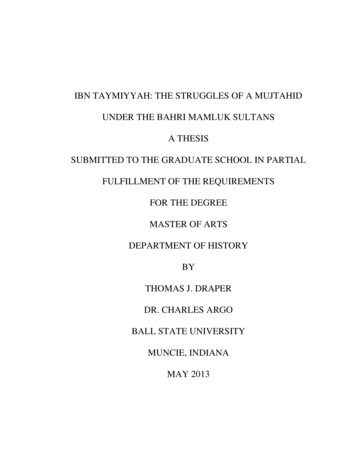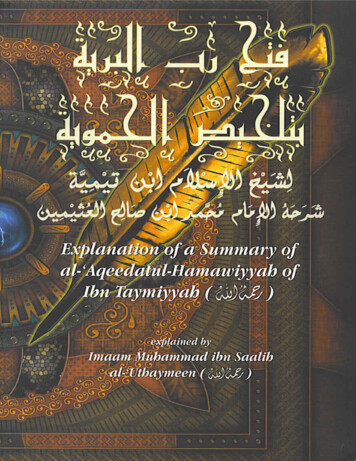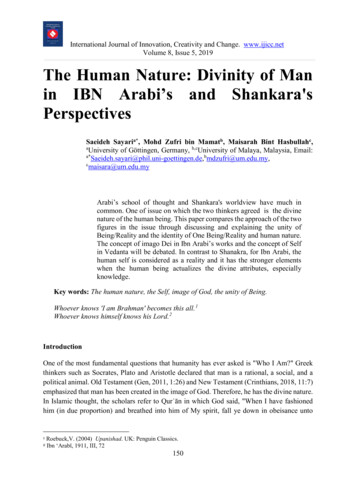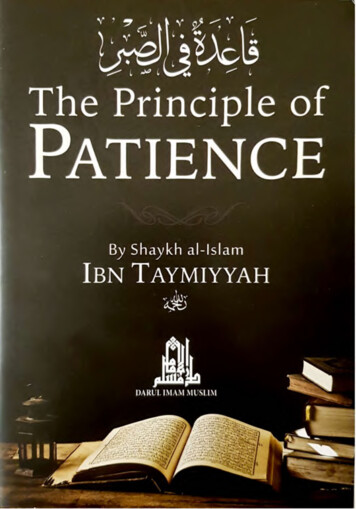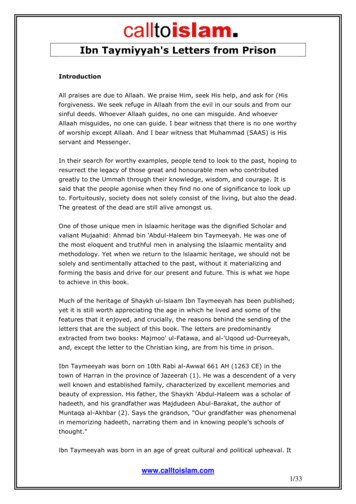
Transcription
Ibn Taymiyyah's Letters from PrisonIntroductionAll praises are due to Allaah. We praise Him, seek His help, and ask for (Hisforgiveness. We seek refuge in Allaah from the evil in our souls and from oursinful deeds. Whoever Allaah guides, no one can misguide. And whoeverAllaah misguides, no one can guide. I bear witness that there is no one worthyof worship except Allaah. And I bear witness that Muhammad (SAAS) is Hisservant and Messenger.In their search for worthy examples, people tend to look to the past, hoping toresurrect the legacy of those great and honourable men who contributedgreatly to the Ummah through their knowledge, wisdom, and courage. It issaid that the people agonise when they find no one of significance to look upto. Fortuitously, society does not solely consist of the living, but also the dead.The greatest of the dead are still alive amongst us.One of those unique men in lslaamic heritage was the dignified Scholar andvaliant Mujaahid: Ahmad bin 'Abdul-Haleem bin Taymeeyah. He was one ofthe most eloquent and truthful men in analysing the lslaamic mentality andmethodology. Yet when we return to the lslaamic heritage, we should not besolely and sentimentally attached to the past, without it materializing andforming the basis and drive for our present and future. This is what we hopeto achieve in this book.Much of the heritage of Shaykh ul-lslaam Ibn Taymeeyah has been published;yet it is still worth appreciating the age in which he lived and some of thefeatures that it enjoyed, and crucially, the reasons behind the sending of theletters that are the subject of this book. The letters are predominantlyextracted from two books: Majmoo' ul-Fatawa, and al-'Uqood ud-Durreeyah,and, except the letter to the Christian king, are from his time in prison.Ibn Taymeeyah was born on 10th Rabi al-Awwal 661 AH (1263 CE) in thetown of Harran in the province of Jazeerah (1). He was a descendent of a verywell known and established family, characterized by excellent memories andbeauty of expression. His father, the Shaykh 'Abdul-Haleem was a scholar ofhadeeth, and his grandfather was Majdudeen Abul-Barakat, the author ofMuntaqa al-Akhbar (2). Says the grandson, "Our grandfather was phenomenalin memorizing hadeeth, narrating them and in knowing people's schools ofthought."lbn Taymeeyah was born in an age of great cultural and political upheaval. Itwww.calltoislam.com1/33
was only five years prior to his birth that Baghdad was ravaged andmercilessly destroyed by the Tatars, and his family had to flee to Damascuswhen he was young. The savagery of those invaders had undoubtedly giventhe boy a deep hatred of oppression, and further instilled in him courage tofight the enemy.The age of lbn Taymeeyah was also characterized by the rise of manydisciplines. The underlying themes of these sciences, were their depth,breadth, and their authors' attempts to fuse the rising sciences together.Indeed, many of the books resembled encyclopaedias. lbn Taymeeyah hadbenefited from such an environment, but at the same time he did not contenthimself to that which he was taught. Instead, he was diligent in learning butmaintained an independence of thought. This meant that he was not restrictedto one teacher or school of thought, and thereby he gained from all, andproduced novel ideas. This search for knowledge led him to be familiar withmany of his age's cultures and creeds. He wrote extensively on beliefs,explaining the true one and rebuking those who disagreed; but tafseer(explanation of the Qur'aan) remained the subject that always captivated him."I might read a hundred interpretations of one verse, but would still askAllaah's guidance in its comprehension saying, 'Oh teacher of Aadam andlbraaheem teach me!' I would also go to the deserted masjids and ask Allah,'Oh teacher of lbraaheem! Make me comprehend.'" His contemporaries werequick to recognise his merit, as al-Qadi az-Zamalkaanee gave a truedescription, "Just as Allaah had made iron soft for Daawood, He madesciences supple for Ibn Taymeeyah's grasp."Why was Ibn Taymeeyah such a distinguished figure, one might ask. Firstly,there was his constant and unbroken bond with the masses of Muslims, for hewas their teacher and mentor, he would resolve their problems and defendtheir rights in the face of the rulers. He would try to keep them steadfastwhen their enemies attacked, he would enjoin the good and forbid the evil,and most especially, he was not diverted by mundane worldly matters.Therefore, the whole of his time was devoted to attaining knowledge andparticipating in jihads. Indeed, it was this strong connection that made thegeneral masses of Damascus love, respect and honour him. Even the mostjealous of his enemies were not able to harm him there, but instead they hadtheir chance in Egypt where he was not as well known.These sincere feelings for the affairs of Muslims can be sensed when Shaykhul-lslaam spoke regarding politics, "Civilisation is rooted in justice, and theconsequences of oppression are devastating. Therefore, it is said that Allaahaids the just state even if it is non-Muslim, yet withholds His help from theoppressive state even if it is Muslim." He also said,"There are sincere Muslimswho perceive that commanding a high post (3) inevitably leads to love of rulewww.calltoislam.com2/33
and wealth. Some common Muslims regard the acceptor of such responsibility,as a turning away from the 'religion of mercy and humbleness'. However, thecorrect attitude is that the appointment of the virtuous serves the Ummah farbetter than assigning posts to the wicked." His concern was also with thepublic in economic problems, attacking those who establish monopolies overfoodstuffs, "In times of need, the ruler can force people to sell their goods attheir original value!"As the Tatars were approaching Damascus, fear gripped the population andsome thought of fleeing. Yet Ibn Taymeeyah rejected such defeatist ideas andinstead, he appealed for the people not to depart and to be steadfast. Hewould say in encouragement to the generals of the army, "Allaah will grant usvictory!" and they would respond by asking him to say, "Insh'Allaah," but hewould reply, "I say it in certainty and not in mere hope!" Indeed, heparticipated in the jihaad against the Tatars in the battle of Shaqhab afterannouncing his famous Fatwa declaring the Tatars kaffir, due to theirinsistence upon the abandonment of some of the rites of Islaam, even thoughthey pronounced the Shahaadah.When one of the scholars was imprisoned, and the news reached IbnTaymeeyah, he personally went and managed the scholar's release, afterpraising and vindicating him in front of the ruler of Damascus. In anotherinstance, he heard of a man who blasphemed against the Prophet (salallaahualayhi wa salam), so he stood to forbid the evil, and with the massessupporting him, he wrote the famous book, as-Sarim al-Maslool 'ala Shatemar-Rasool (4). Furthermore, his deep concern for the Muslims, and his intimateknowledge of their affairs in every country, their conditions, and theirnearness or distance to Islaam stands out. This is illustrated in his descriptionof the Muslims in the lands of Sham (5) and Egypt who, were standing firm athis time, defending their lands. "lf one is to review the affairs of the world, one would inevitably realise thatthis group in ash-sham and Egypt are the most staunch group upholding theDeen in knowledge, action and jihads. They are relieving the Muslimsthroughout the world of their obligation of jihaad as they struggle against thehardened disbelievers. The prestige of all Muslims is derived from that group'sglory. . ."For the inhabitants of Yemen are weak, and unable or unwilling to carry outjihads, subservient to their rulers,"The Hijaazi peoples are swamped in the depths of innovations andmisguidance, and their people of knowledge and faith are weak and subdued.lf that group in ash-Sham and Egypt were to be subjugated - and l seekwww.calltoislam.com3/33
refuge in Allah from that- then those from Hijaaz would be rendered the mostdegraded of Allaah's servants."The lands of Africa (6) are led by its Bedouins and they are very wicked, andthemselves deserving to be conquered by jihaad. Further on, the lands of theMaghreb are all but occupied by the Europeans, yet Muslims there do notattempt their jihads. Had Tatars occupied those regions, they would haveencountered timid people. . ."Therefore, it is clear that it is that group situated in ash-Sham and Egypt whoare the vanguard of Islam, their success is an honour for Islaam, and theirdefeat is a calamity for it."This lengthy quote is included for its importance and to demonstrate lbnTaymeeyah's up-to-date insight into the affairs of his time, and mistreatability to interpret the social and psychological condition of the people.Secondly, next to the Shaykh's connection with the masses and knowledge ofcurrent affairs, he also possessed a depth of understanding and a high level ofalertness. He noticed that, from the end of the second century AH, thereexisted of a group of Muslims who were fascinated by the philosophies of Platoand the logic of Aristotle (7). That group tried to instil the theories of thephilosophers into the pure creed, thereby disfiguring it, so that beneficialknowledge was turned into sterile debate and idle discussion. The abstracttheories had never been able to grant felicity to mankind, which wasalways granted in the light of Prophethood. Truly, here is an Imaamuninfected by an inferiority complex that diseased some scholars, past andpresent.Thirdly, the letters, which were selected for this book, are another side of IbnTaymeeyah. A side many people do not know of. Usually, it is hisuncompromising stances and truthful, sometimes harsh retorts that are oftenremembered. However, there is a side of his character that writes a letter tohis mother full of concern, leniency and respect. Other letters are for hisbrothers and students in Damascus, and are characterized by love and advice.He also shows forgiveness towards those who worked to imprison him.Another is a letter full of wisdom, eloquence and firmness to a Christian king.This is the side of his character unknown to many - that of Ibn Taymeeyah,the benevolent man with a heart full of eemaan and mercy.These letters were predominantly written in prison. But why was such aShaykhimprisoned? He was neither imprisoned by a non-Muslim state nor by anoppressive ruler. Unfortunately, his gaoling was conspired by some of theenvious Shaykhs of his time, "due to his individual distinction in enjoining thewww.calltoislam.com4/33
good and forbidding the evil, for people's genuine love and adherence to him,and to the large number of his followers." (8) This is along with theirasabeeyah (9) to what they themselves wrote in Fiqh or Beliefs, and althoughsome did it with a good intention, they nevertheless all conspired to provokethe ruler against Ibn Taymeeyah, and as a result he was imprisoned in Cairo,Alexandria and Damascus.Herein lies a serious problem. How can a scholar be imprisoned as a result ofan ijtihaad, by which he differed from other scholars yet never transgressedbeyond the boundaries of ijtihaad, and certainly not outside of Islaam? How isit that we cannot accommodate another opinion by a scholar noted for his lovefor Allaah and His Messenger? One says this not to solely dig into the past, butbecause currently, there are similar incidents and this is indeed a very pitifulstate. Our hearts should be big enough to encompass disagreements as longas they are not in the areas of innovation, deviation or legislation contradictingAllaah's command. We should not resort to replies and retorts, which showfalse piety and bravery, or to using titles to give the mistaken impression of abattle being waged against an enemy, as if with swords and not with thewords that are being used.We return to Shaykh ul-Islaam in prison. The story began when he wrote atreatise entitled al-Hamaweeyab in reply to a question from the town of Hamaregarding Allaah's Attributes in 698 AH. He was asked to explain the treatisein Damascus in a few public gatherings. There, he informed the Deputy Sultanthat what was in the treatise was not novel, but had been written in his ownbook 'Aqeedah al-Wassiteeyah a few years earlier, and that both booksincluded the beliefs of Ahlus-Sunnah. None could debate or doubt his strongand evidence-based works. The Deputy tried to resolve the objections of otherscholars, by announcing that IbnTaymeeyah's works were following thetradition of Imaam Ahmad bin Hanbal. Ibn Taymeeyah rejected this appeasingattitude, and replied that it was the 'Aqeedah of the predecessors, and wasnot exclusive to Imaam Ahmad.The Shaykhs of Egypt succeeded where their counterparts in Damascus failed.This was due to his credibility and trustworthiness in the second capitalDamascus, and his anonymity in the first (Cairo, Egypt). The Shaykhs in Cairohad managed to incite the oppressive ruler, Ruknudeen Baybars the Jashangirwhose personal shaykh and mentor, was a fanatical Soofee named Nasr alManbaji (10). As a result, a sultanate order was issued to bring IbnTaymeeyah to Cairo for interrogation in 705 AH. Against the advice of theDeputy Sultan in Damascus, Shaykh ul-Islaam decided to go to Egypt as hesaw much benefit in being there. On his day of departure, says his student Ibn'Abdul-Haadi, "People gathered to bid their farewells, overwhelmed by griefand surprise. . . many weeping." (11)www.calltoislam.com5/33
When Shaykh ul-Islaam arrived in Egypt, a tribunal chaired by the judge IbnMakhloof al-Maaliki was arranged. However, the Shaykh felt that his arbiterwas also his opponent, and thus refused to answer questions. As a result, hewas imprisoned in the Mount's Castle in Cairo with his brothers 'Adullaah and'Abdur-Rahman. In the meantime, he sent a letter to one of his relativeswherein he mentions that he refused the gift of the Sultanate, not wanting tobe defiled in anyway.Eighteen months passed before Ibn Taymeeyah was released unconditionallyafter the intervention of an Arab Prince named Husamudeen bin 'Eesaa in 707AH. There were earlier initiatives that failed, due to Ibn Taymeeyah's captorsattempting to attach conditions that were unacceptable to him. After hisrelease, Ibn Taymeeyah stayed in Cairo where he established classes andcircles of knowledge in masjids, to benefit the people thereby. Yet those whoharboured rotten ideas, feared the light of guidance emanating from thepresence of the Shaykh amongst them. After the Sultan received theircomplaints, he decided to expel Shaykh ul-Islaam back to Syria, but withconditions, which he later accepted at the insistence of his followers. As hewas embarking upon his trip, an orderers issued to re-imprison him (12). Onemust relay the magnificent scene witnessed when Shaykh ul-Islaam was rejailed,"When he entered prison, he saw the prisoners busy with all kinds of timewasting games for entertainment, such as chess and dice games, leading toloss of prayer. The Shaykh rebuked them strongly, and commanded them tokeep the prayers, and turn towards Allaah in worship, repentance and gooddeeds. He taught them from the Sunnah what they needed to know,encouraging them to do good, and bolstering their faith, and thereby renderedthe prison a haven for seekers of the knowledge of religion. Such a placebecame better than schools and circles. Some of the released prisonerspreferred staying with him rather than being free; and those frequenting hiscompany increased to a point where the prison became full of them!" (13)This state of affairs did not please the envious, and so he was sent to a prisonin Alexandria. Soon afterwards, the self-exiled Sultan Muhammad binQalawoon, who had a great deal of respect for the Shaykh returned intriumph. The Sultan asked for Ibn Taymeeyah to be returned to Cairo. Whenhe came to the Sultanate court, it was full of princes and scholars. The Sultanstood up for the Shaykh greeting him warmly, and then took him to a distantcorner and asked, "There are amongst those scholars present here, thosewhose oath was given to the Jashangir (Qalawoon's former rival), and hadslandered you.'' He then asked for his opinion (fatwa) to exterminate them.The Shaykh strongly objected and replied, "If they were to go, none of thewww.calltoislam.com6/33
same calibre could then be found in your country. As for what they have doneto me, and my right to extract a punishment, I forgive them, and they arefree." (14) And thus the coming of Shaykh ul-Islaam to Cairo was sealed,where he resided near al-Hussayn Masjid, with his ever-present commitmentto the spreading of knowledge, and courageous enjoining the good andforbidding the evil.In 712 AH, Ibn Taymeeyah returned to Damascus after an absence of sevenyears and few days. The Egyptian Army that had been dispatched to block theattack of the Tatars accompanied him. He later resettled in Damascusreturning to publicise the knowledge of the religion. Yet again, his opponentswould not leave him as he gave a fatwa that contradicted their opinions. Thiswas coupled with what they had found in his book Iqtida 'as-Siraat ulMustaqim in the form of a chapter on 'Travelling in order to visit graves' andits unlawfulness according to the texts. By this time, the envious scholars hadmanaged to change the mind of the hitherto sympathetic Sultan, who in turnordered Ibn Taymeeyah's arrest to the Castle in Damascus. Shaykh ul-lslaamwas uttering the verse whilst entering his cell: "And thereupon a wall will beraised between them, with a gate in it. Within it will be grace and mercy, andthe outside thereof suffering." Al-Qur'aan 57:13In prison he continued to write, working on tafseer, reciting the Qur'aan, andworshipping his Lord. He was later refused access to ink, paper and books,and soon after that, the enlightened heart stopped, and the pure soul passedto the grace of its Lord in the confines of prison in 728 AH. May Allaah havemercy on him, please him and be pleased with him. Thus was the story of thereformer and revivalist Imaam. The example of knowledge, jihaad andchivalry.of one who forgave his opponents save those enemies of Allaah andHis Messenger.Footnotes1. Situated north of Syria and Iraq today.2. A famous book that Imaam ash-Shawkaanee explained in his Nayl ulAwtaar.3. E.g. a judge, a minister, or an administrator.4. Meaning, "The Drawn Sword on the Blasphemer of the Prophet."5. The lands of ash-Sham refer to the areas that were historically under theadministrational Damascus, Syria, They include today's Syria, Lebanon,Palestine and Jordan.6. The term 'lands of Africa' refers to today's Libya, Tunisia and Algeria.7. Just as some are captivated by the discourse of the Orientalists today.8. Ibn Katheer, al-Bidaya wan-Nihaya, vol. 14, pg.37.9. Meaning unjustified blind following of a certain idea, party or place,www.calltoislam.com7/33
belittling and rebuking those who are different. It does not mean merefollowing.10. The Sultan then was Muhammad bin Qalawoon, but as he increasinglysensed that the strong man was the Jashangir and not himself, he left toperform Hajj and then settled in Karak (Jordan), in a face-saving exercise, buthe returned later.11. Al-'Uqood ud-Durreeyah, pg. 249.12. As Allaah says, the Exalted in Might, about the people of Egypt regardingYoosuf: "Even after they had seen all the signs (of Yoosuf's innocence) thatthey might as well imprison him for a time." It is also striking how the Shaykhstayed for seven years in Egypt, akin to the seven fertile years that Yoosuf(alayhis salam had told the good tidings of).13. Al-'Uqood ud-Durreeyah, pg. 269.14. Ibid. pg. 282.LETTERS FROM PRISONIbn Taymeeyah, raheemahullaahLetter One: The letter of Shaykh ul-Islaam Ibn Taymeeyah to his mother, inwhich he apologises for his stay in Egypt. A stay he felt was necessary toeducate the people.In the name of Allaah, Most Merciful, Dispenser of MercyFrom Ahmad bin Taymeeyah to my dear and honourable Mother, may Allaahbless her amply, and grant her peace and comfort, and make her amongst thebest of His servants, Assalamu 'alaykum wa rahmatullaahi wa barakatuh.We praise Allaah, the most worthy of praise. There is no deity worthy ofworship but He, and He has Power over all things. We ask Him to bless theSeal of the Prophets and Imaam of the pious, Muhammad His servant andMessenger (salallaahu alayhi wa salam).Indeed the bounties of Allaah come abundantly, and His aid is never ending.We praise Him for it, and ask Him to increase His favour. It will not escapeyou, my contented mother, the fact that our stay in Egypt is for an importantissue. The abandonment of such a task leads to the corruption of our Deenand of our life.Yet it was not our choice to be far from you. Had birds been able to carry us,we would have come to you. But the absent one has his reason; and had youbeen able to look deeply into the affairs of the Muslims, you would not choosefor me another place to the one I am in now. Nevertheless, I had neverintended to reside here permanently. Instead, I pray to Allaah to guide youwww.calltoislam.com8/33
and I to the right choice, and I pray for your well-being. I ask Allaah to blessus and the rest of the Muslims, with His goodness and what that goodnessencompasses of safety and benefit.Allaah had opened for me His gates of blessings, mercy and guidance in a wayI have never conceived of before. Yet I am always considering travel towardsyou, making the prayers of Istikhaarah. It is inconceivable for me, if given thechoice, to favour any of this life's mundane issues or of the lesser obligationsof the Deen, to being close to you. Yet there are great issues which l cannotabandon for fear of their general and personal dangers (1) - and the witnesssees what the absent does not.I beseech you to supplicate to Allaah profusely. Ask Him to guide us to chooseour best paths, for He Knows and we do not, and He is able and we are weak.The Messenger of Allaah (salallaahu alayhi wa salam) said:It is from the happiness of the son of Aadam to practice lstikhaarah and bepleased wîth what Allaah had ordained for him. And it is from the misery ofthe son of Aadam to drop tbe Istikhaarah of Allaah and be displeased atAllaah's decrees. (2)Indeed, the travelling trader might fear the loss of his money, so he resides ata place until he is able to travel once again. The matter that we are in themiddle of is too great to describe, but there is no power or ability but throughAllaah.Finally, convey my salaam to the entire household, young and old, and therest of neighbours, friends and relatives one by one.Wasalamu 'alaykum wa rahmatullaahi wa barakatuh!Praise be to Allaah, and may His Blessings and Peace be upon Muhammad, hisfamily and companions.Footnotes1. Shaykh Muhammad Aboo Zahrah comments on his book Ibn Taymeeyah:the general danger is the corruption of people. The personal one is that as aScholar, he has to fulfil his obligation of guiding the people to the right way.There is also another danger which, is that Ibn Taymeeyah came to Egyptwhilst accused in his belief, and that he has a right to defend and vindicatehimself.2. Shaykh Hamed al-Faqi commented of this hadeeth by saying that it wasrelated by at-Tirmithee and he called it hasan ghareeb; and it was alsowww.calltoislam.com9/33
narrated by Ahmad, Aboo Ya'laa and al-Haakim who said of it: Saheeh allsnad. (al-'Uqood ud-Durreeyah, p257)Letter Two - This is the first of two letters especially written for the benefit ofhis students and brothers in Damascus. It is apparent that this letter was sentafter the first release from gaol where lbn Taymeeyah was imprisoned for 18months from the beginning of 705 AH. Upon his release, the Deputy Sultanasked the Shaykh to stay in Cairo which he did, proclaiming the Da'wa andcontacting people. Also apparent in this letter, is his forgiveness towards hisopponents, asking his brothers not to harm them because of him. These arethe manners of the intelligent and chivalrous scholar. He said after praisingAllaab and conveying blessings upon the Prophet (salallaahu alayhi wa salam):In the name of Allaah, Most Merciful, Dispenser of MercyTruly Allaah, the most worthy of praise, Has bestowed upon me great rewardsand immense merits that oblige me to thank Him, and be steadfast upon Hisworship, and be patient at all times in fulfilling the obligations. Patience is anobligation in itself, commanded by Allaah in times of ease more than at timesof unease. Allaah says:"Thus it is, if We let man taste some of our grace, and then take it away fromhim - behold, he abandons all hope, forgetting all gratitude (for our pastfavours). And thus it is if we let him taste ease and plenty after hardship hadvisited him, he is sure to say: "Gone is all affliction from me" - for, behold, heis given to vain exultation, and glories only in himself. [And thus it is withmost men] save those who are patient in adversity and do righteous deeds: itis they whom forgiveness of sins awaits, and a great reward." [Al Qur'aan11:9-11]My brothers, you know that Allaah, the Exalted in Might, had favoured me inthis matter (1), with favours He usually reserves for the assistance of Hissoldiers in order to elevate His Word, aid His religion, strengthen Ahlul-sunnahwal Jama'ah, and humiliate the people of innovation and deviation (2). Theguidance of the Sunnah was proclaimed conclusively with proofs. This lead tothe truth prevailing to so many people, and their returning to the way ofAhlus-sunnah wal Jama'ah. You should know that one of the great principles ofthis religion is the bringing of Muslims' hearts together and unifying their call.Allaah the Glorified says:"Remain conscious of Allaah, and keep alive the bonds of brotherhood amongyourselves." [Al Qur'aan 8:1]"And hold fast, all together, to the rope of Allaah, and do not draw apart fromwww.calltoislam.com10/33
one another." [Al Qur'aan 3:103]"And be not like those who have drawn apart from one another and havetaken to conflicting views after all evidence of the truth has come to them."[Al Qur'aan 5:105]Similarly, one of the fundamental themes of the Sunnah is obedience to theMessenger (salallaahu alayhi wa salam). Therefore the Prophet (salallaahualayhi wa salam) said in the authentic hadeeth related by Muslim on theauthority of Aboo Hurayrah:"Allaah is pleased with you on three occasions. (Firstly) when you worship Himand do not associate any partners with Him. (Secondly) when you hold fast,all together to the bond of Allaah and do not draw apart and, (thirdly) whenyou advise the good rulers whom Allaah had placed in charge of your affairs."Furthermore, in the hadeeth of Zayd bin Thaabit and Ibn Mas'ood, who wereboth among the scholars from the companions that the Messenger of Allaahsaid:"May Allaah brighten the face of a man who hears me and then relays toanother who has not. It impossible that a carrier of knowledge is not himselfknowledgeable, or that the carrier of knowledge will deliver it to someonemore knowledgeable. Three things purify the heart of a Muslim. The sincerityin working for the sake of Allaah, taking-up the task of advising the rulers,and not departing from the group of Muslims."In order to implement this principle on a personal note, I say that it is not mywish for any Muslim to be harmed because of me overtly or covertly. Thisapplies to all Muslims, but more specifically to our companions andacquaintances. Neither do I want any of them to be blamed or condemned, asthey are still worthy of honour and respect. Indeed, man does not escapebeing classified into one of three categories: a correct mutjtahid, a wrong one,and a sinner. The first is rewarded and praised, the second is rewarded yetforgiven for his blunder. Regarding the third, I ask Allaah to forgive him, usand the rest of the Muslims. (3)Therefore, we shall turn a new leaf on those who had erred and not fulfilledthis forementioned principle (4). Yet I know of some who say "this man erred"and "this man did not do what he should have", or "the Shaykh was harmedbecause of this man."Those words that have harmed some brothers I do not condone, nor do Ipardon those who utter them.www.calltoislam.com11/33
You should also know that we are all joining to assist one another. It isobligatory upon us to aid each other, more so now than before. Sowhomsoever thinks that harming some brothers as a result of the hardshipexperienced in Damascus and Egypt, then he is wrong. It is true that abeliever to a believer is like the two hands, one cleans the other. And it is alsotrue that some kinds of dirt can only be washed by hard scrubbing, yet thistreatment will be justified when the outcome appears to the restoration of thatbrotherly love. Let no one think that the believer can be economical withhelping their brothers, and in aiding them. If some of our companions hadneglected us before, they came to us, their status will rise higher than before.You might also know - may Allaah be pleased with you - that issues like thisone often occur due to a difference of opinion and variations that might evenbefall the people of eemaan due to the whispers of shaytaan. Allaah says:"Yet man took it [the trust] up - for, verily, he has always been prone to themost wicked, most foolish. [And so it is] that Allaah imposes suffering on thehypocrites, both men and women, as well as on the men and women whoascribe divinity to anything besides Him. And [so too, it is] that Allaah turns inHis Mercy unto the believing men and believing women: for Allaah is indeedmuch forgiving, a dispenser of grace." [Al Qur'aan 33:72-73]Even the excesses that took place in this issue (5), including themisconceptions, both desires and also the lies and fabrications, were all abonus and benefit as Allaah says:"Verily, numerous among you are those who would falsely accuse others ofunchastity: [but, O you who are thus wronged,]
Ibn Taymiyyah's Letters from Prison Introduction All praises are due to Allaah. We praise Him, seek His help, and ask for (His . extracted from two books: Majmoo' ul-Fatawa, and al-'Uqood ud-Durreeyah, and, except the letter to the Christian king, are from his time in prison. Ibn Taymeeyah was born on 10th Rabi al-Awwal 661 AH (1263 CE) in the
